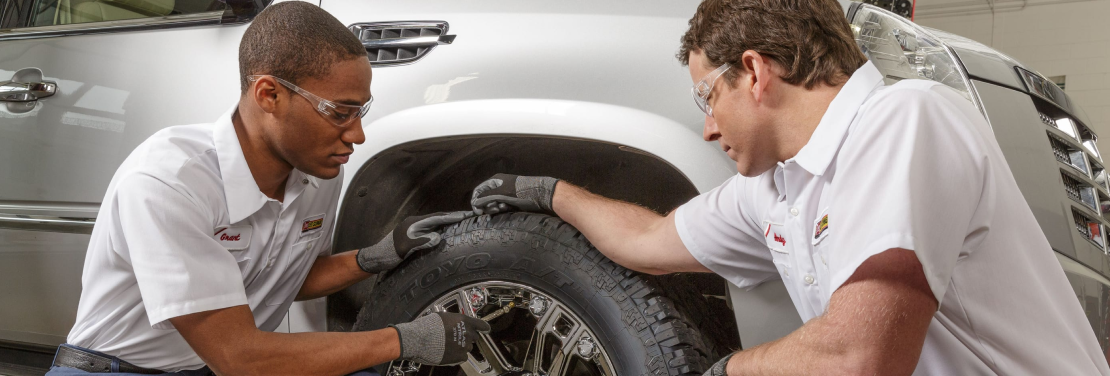Professional Morris Tire and Alignment: Boost Your Automobile's Efficiency
Professional Morris Tire and Alignment: Boost Your Automobile's Efficiency
Blog Article
Tire Service: The Impact of Climate Problems
When it pertains to ensuring optimal performance and safety and security when traveling, recognizing the impact of climate condition on tire solution is essential. From scorching warmth to icy roadways, each weather condition element can significantly influence tire performance and overall driving experience. By delving right into the results of differing weather problems on tires, vehicle drivers can get beneficial understandings that may enhance their vehicle's efficiency and long life. In this conversation, we will check out the detailed partnership between weather and tire solution, clarifying the relevance of weather-specific tire upkeep methods and factors to consider.
Warmth and Tire Performance
When revealed to high temperatures, tires experience modifications in performance that can significantly affect automobile safety and security and handling. The heat produced from long term driving or hot weather condition conditions causes the tire rubber to soften, leading to reduced walk life and enhanced wear.
Moreover, high temperatures can speed up the process of tire aging, triggering the rubber to deteriorate much more promptly. To reduce the results of warm on tire performance, chauffeurs must regularly examine their tire stress, turn tires to make certain also wear, and inspect for any type of indications of damage.
Winter Impacts
Winter problems can have a substantial influence on tire performance and safety. As temperatures decrease, tire rubber can solidify, leading to reduced grip on icy or snow-covered roads. In winter, tires may additionally lose air pressure a lot more swiftly, which can affect managing and fuel efficiency. Additionally, cold temperatures can create tire sidewalls to tense, raising the danger of damage from potholes or other roadway threats.
To minimize the impacts of winter on tires, it is essential to regularly check tire pressure and inflate them to the manufacturer's advised degrees. Utilizing wintertime or all-season tires developed for winter conditions can likewise enhance grip and hold on icy or snowy roadways - morris tire and alignment. Appropriate tire upkeep, including routine assessments for wear and damage, becomes a lot more important throughout colder months to ensure optimum efficiency and security
Rainy Conditions Impact
Tires with worn-out treads are a lot more susceptible to hydroplaning, where a layer of water constructs up between the tire and the road surface area, leading to loss of traction. To fight this, drivers must routinely check their tires for adequate tread depth and think about investing in tires especially made for damp problems.

Snow and Tire Safety And Security
When driving in snowy conditions, having the appropriate tires can make a substantial distinction in security and performance. Winter index season tires are created with unique rubber substances and step patterns to offer better traction on snow and ice contrasted to all-season tires.
In addition to utilizing winter tires, it is crucial to ensure they are appropriately pumped up. Cold weather can trigger tire pressure to go down, affecting grip and handling (tire shop morris). Frequently examining and maintaining the proper tire pressure is essential for optimal efficiency in snowy conditions

Weather-Related Tire Maintenance
When encountered with various weather, appropriate tire maintenance ends up being a crucial facet of automobile security and performance. Weather-related tire upkeep encompasses a series of methods targeted at making sure ideal tire feature and durability in various weather condition situations. One vital aspect of weather-related tire upkeep is tire pressure law. Fluctuating temperatures can cause tire stress to vary, impacting grip and fuel performance. Routinely checking and readjusting tire pressure according to supplier recommendations is important for safe driving in altering weather condition conditions. Additionally, tire walk depth plays a substantial role in taking care of different weather condition components. Tires with appropriate Discover More Here walk deepness provide better grasp on wet or icy roadways, lowering the danger of hydroplaning or skidding. Inspecting tire tread on a regular basis and changing tires when tread wear reaches a particular deepness is crucial for preserving grip and stability in unfavorable climate. By focusing on weather-related tire maintenance, vehicle drivers can improve safety, boost automobile performance, and lengthen the lifespan of their tires.
Conclusion
Finally, weather have a significant influence on tire performance and safety. From warmth influencing tire stress and put on to chilly climate decreasing grip, it is important to take into consideration the weather when keeping and utilizing tires. Wet problems can decrease grasp and cause hydroplaning, while snow can increase the risk of a fantastic read accidents if tires are not appropriately furnished. Weather-related tire maintenance is vital in guaranteeing optimal performance and safety and security when driving.
In this conversation, we will discover the intricate relationship between weather condition conditions and tire service, shedding light on the importance of weather-specific tire upkeep techniques and considerations.

Report this page